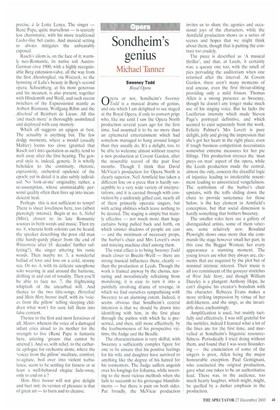Sondheim's genius
Michael Tanner
Sweeney Todd Royal Opera
Qpera or not, Sondheim's Sweeney Todd is a musical drama of genius, and one which I am delighted to see staged at the Royal Opera, if only to convert prigs who, like me until I saw the Opera North production several years ago for the first time, had assumed it to be no more than an ephemeral entertainment which had somehow managed to hang around longer than they usually do. It's a delight, too, to be able to welcome almost without reserve a new production at Covent Garden, after the miserable record of the past four months. Though I think that David McVicar's production for Opera North is clearly superior, Neil Armfield has taken a different line on a piece that is hardly susceptible to a very wide variety of interpretations, and it is carried through with conviction by a uniformly gifted cast, nearly all of them primarily operatic singers, but with acting abilities which leave nothing to be desired. The staging is simple but mainly effective — not much more than huge curtains being pulled back and forth, on which sinister shadows of people are cast
and the minimum of necessary props, the barber's chair and Mrs Lovett's oven and mincing machine chief among them.
The total effect is to bring Sweeney Todd much closer to Brecht–Weill — there are strong musical influences there, clearly — than the production at Leeds. Though the work is framed anyway by the chorus, narrating and moralistically refraining from moralising, it is easy to turn it into a painfully involving drama of revenge, in which we find ourselves sympathising with Sweeney to an alarming extent. Indeed, it seems obvious that Sondheim's central intention is that we should be drawn into identifying with him, in the first place through the pathos with which he is presented, and then, still more effectively, by the loathsomeness of his prospective victims, the Judge and the Beadle.
The characterisation is very skilful, with Sweeney a sufficiently complex figure for one to be unsure that his positive feelings for his wife and daughter have survived to anything like the degree of his hatred for his tormentors. The Judge suffers anguish over his longings for Johanna, while resorting to the most vicious methods when she fails to succumb to his grotesque blandishments — but there is pain on both sides. Put broadly, the Mc Vicar production invites us to share the agonies and occasional joys of the characters, while the Armfield production shows us a series of scenes and hopes that we might think about them, though that is putting the contrast too crudely.
The piece is described as 'A musical thriller', and that, at Leeds, it certainly was; a queasy one too, with the smell of pies pervading the auditorium when one returned after the interval. At Covent Garden, there aren't many moments of real unease, even the first throat-slitting providing only a mild frisson. Thomas Allen is a strong presence as Sweeney, though he doesn't any longer make much use of his singing voice. But he lacks the Luciferian intensity which made Steven Page's portrayal definitive, and which seemed to exist separately from the work. Felicity Palmer's Mrs Lovett is pure delight, jolly and giving the impression that she's got her heart in the right place, even if tough business competition necessitates somewhat extreme measures for her pie fillings. This production stresses the 'man preys on man' aspect of the opera, while the Leeds production made the central, almost the only, concern the dreadful logic of injustice leading to intolerable resentment leading to unrestricted vengefulness. The symbolism of the barber's chair upstairs, with the toffs sliding down the chute to provide sustenance for those below, is the key element in Armfield's conception, but that social dimension is hardly something that bothers Sweeney.
The smaller roles here are a gallery of distinguished artists, some of them veterans, some relatively new. Rosalind Plowright shows once more that she commands the stage however small her part, in this case the Beggar Woman; her every appearance a stunning moment. The young lovers are what they always are, elements that are required by the plot but of minimal intrinsic interest. Their music is all too reminiscent of the gooeyer stretches of West Side Story, and though William Dazeley is a plangent Anthony Hope, he can't disguise his creator's boredom with the character. Rebecca Evans makes a more striking impression by virtue of her doll-likeness, and she sings, as she invariably does. enchantingly.
Amplification is used, but mainly tactfully and effectively. I was still grateful for the surtitles, indeed I learned what a lot of the lines are for the first time, and marvelled at Sondheim's linguistic resourcefulness. Periodically I tried doing without them, and found that I was soon floundering — the enunciation of some of the singers is poor, Allen being the major honourable exception. Paul Gernignani, who conducted the original production, gave what one takes to be an authoritative lead. There was, in the audience, too much hearty laughter, which might, might, be quelled by a darker emphasis in the production.


























































 Previous page
Previous page